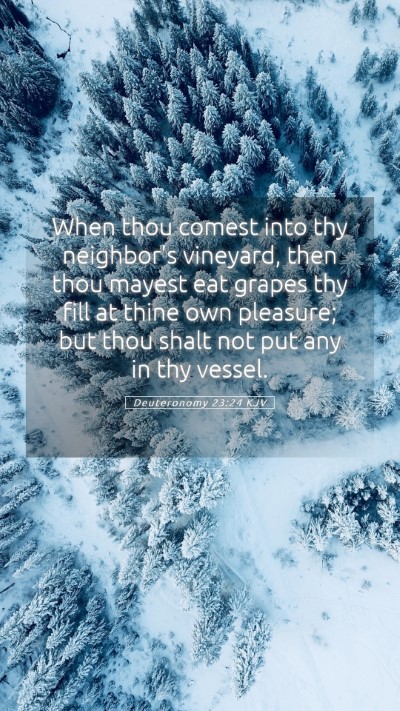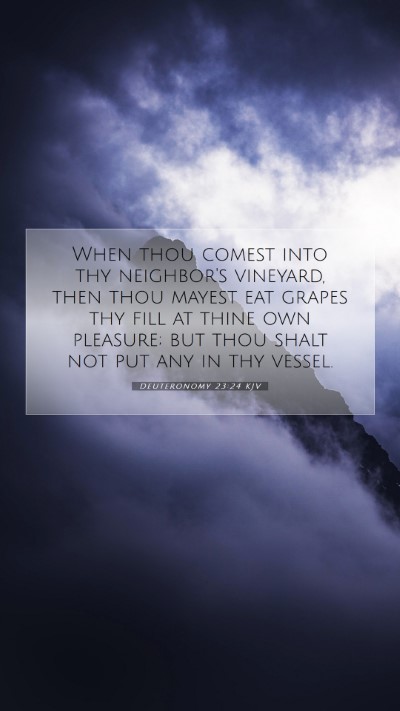Understanding Deuteronomy 23:24: A Comprehensive Bible Verse Explanation
Verse: "When you enter your neighbor's vineyard, you may eat all the grapes you want, but do not put any in your basket." (Deuteronomy 23:24, NIV)
Introduction
This verse addresses the principle of gleaning and emphasizes the balance between personal needs and respect for others’ property. The wisdom contained within this scripture offers profound Bible verse meanings and Bible verse interpretations that resonate with broader biblical themes.
Contextual Background
Deuteronomy 23 is part of a larger discourse regarding laws given to the Israelites as they prepared to enter the Promised Land. It discusses issues surrounding community ethics, hospitality, and respect for one's neighbor, which are foundational to their community's success and cohesion.
Commentary Insights
The insights from respected scholars provide valuable Bible verse commentary that enhances our understanding of Scripture.
Matthew Henry Commentary
Matthew Henry emphasizes the principle of moderation and respect for others' rights in his analysis of this verse. He suggests that while it is permissible to partake from your neighbor's vineyard out of necessity, it should not lead to the exploitation of that resource. Henry highlights that this directive cultivates a sense of community and mutual respect among Israelites.
Albert Barnes Commentary
Albert Barnes elaborates on the cultural practices surrounding harvest and gleaning laws, explaining that they were designed to care for the poor and needy. He notes that this law encourages generosity among neighbors while preventing greed. Barnes rightly underscores that such laws helped to maintain social order and fairness in the community, essentially reflecting God's concern for equity.
Adam Clarke Commentary
Adam Clarke points out the practical reasons behind this statute. He argues that permitting someone to eat grapes provides immediate relief without disrupting the harvest. However, Clarke insists on the importance of honoring boundaries and property rights, suggesting that this understanding is crucial for fostering healthy relationships in society.
Significance of the Verse
In this single verse, profound Biblical exegesis emerges, allowing us to glean insights into not only laws of ancient times but also the ethical implications for modern believers. The verse encourages respect for personal property while promoting kindness and generosity.
Application of Deuteronomy 23:24 in Daily Life
Applying the teachings of this verse can enhance ethical practices in our daily interactions. Here’s how:
- Respect Boundaries: Understand and honor the limits set by others in both personal and community contexts.
- Generosity: Offer help to neighbors in need while respecting their provisions.
- Moderation: Partake of resources mindfully and without exploitation.
Cross References
Below are some additional scriptures that relate to the themes found in Deuteronomy 23:24:
- Leviticus 19:9-10: Gleaning laws for the poor.
- Deuteronomy 24:19: Protection of the poor during harvesting.
- Matthew 12:1-8: Jesus’ teaching on the Sabbath and mercy.
Conclusion
In summary, Deuteronomy 23:24 enlightens readers on the importance of community ethics. By dissecting the meaning of Bible verses through various commentaries, we gain a richer Bible verse understanding that encourages us to live in harmony and respect for one another.
Further Study and Exploration
For those interested in a deeper dive into biblical teachings, consider exploring topics like:
- Online Bible study: Utilize various online platforms for group discussions.
- Bible study materials: Gather resources that provide historical context and application insights.
- Bible study guides: Follow structured lessons to enhance your learning.


